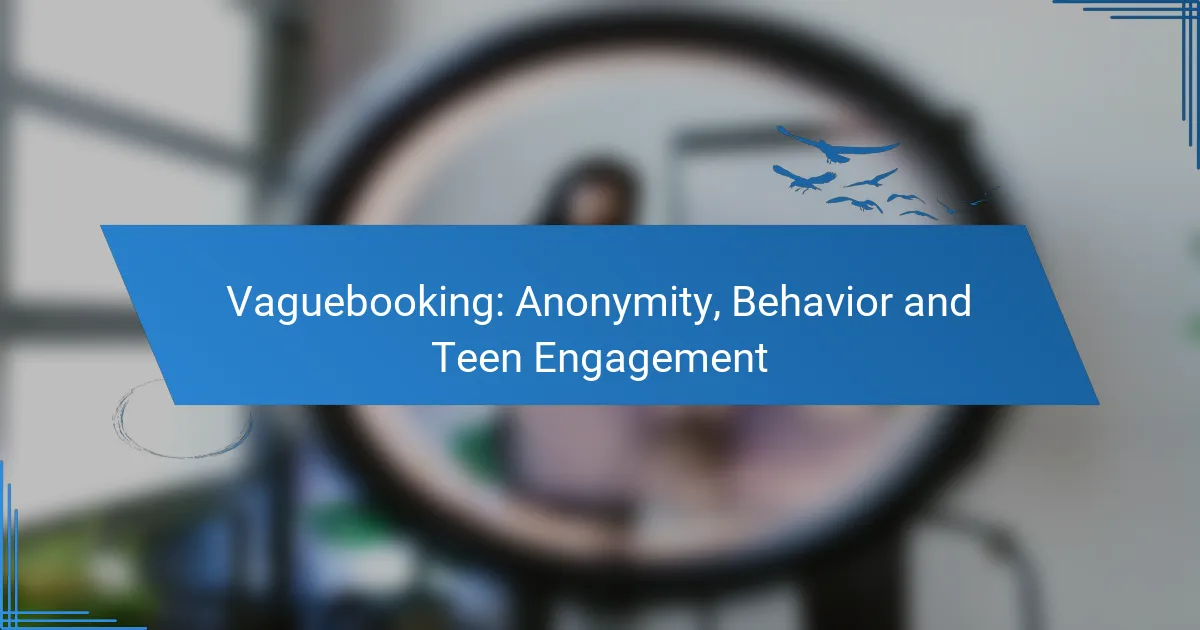Vaguebooking, the practice of sharing ambiguous posts on social media, plays a notable role in shaping teen engagement in Canada by igniting curiosity and emotional responses among peers. This behavior can lead to heightened interactions as teenagers seek to decipher the meaning behind these cryptic messages, while also contributing to feelings of anxiety and a desire for validation. Understanding the implications of vaguebooking is crucial for fostering healthier online behaviors and supporting teens in navigating their social relationships.
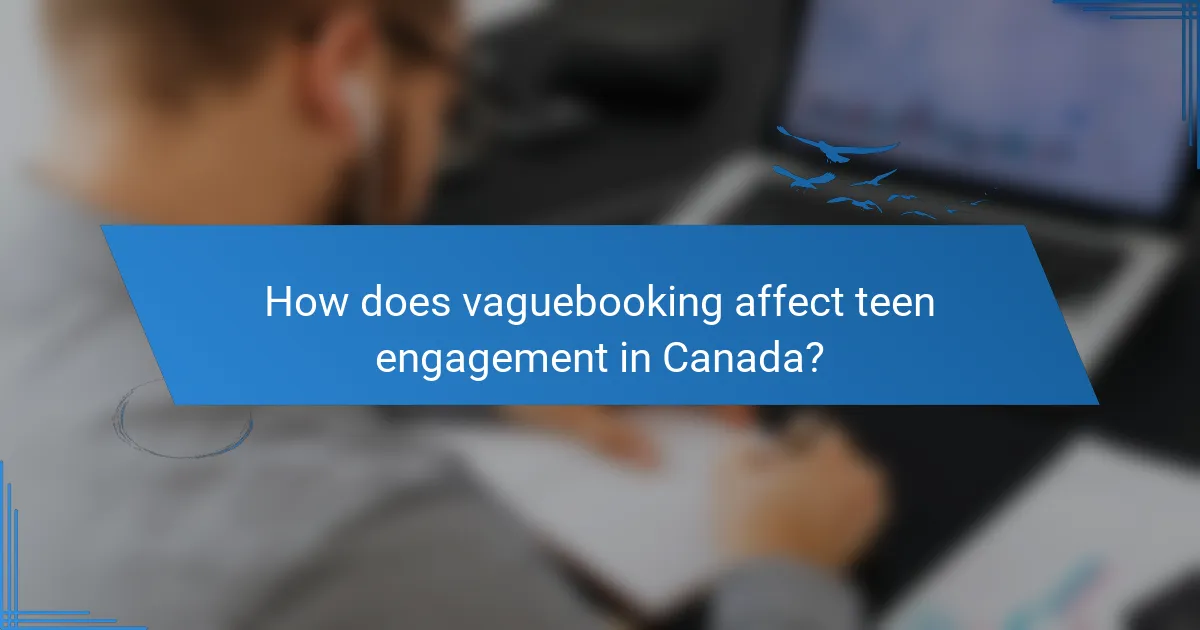
How does vaguebooking affect teen engagement in Canada?
Vaguebooking, the act of posting ambiguous or unclear messages on social media, significantly impacts teen engagement in Canada by sparking curiosity and emotional reactions among peers. This behavior often leads to increased interactions as teens seek clarification or connection through these cryptic posts.
Increased curiosity among peers
When teens engage in vaguebooking, they often leave their friends guessing about the meaning behind their posts. This uncertainty can create a buzz among peers, prompting them to inquire further or speculate about the situation. For example, a post like “Feeling lost today” may lead to numerous comments asking what’s wrong, thereby increasing engagement.
This curiosity can foster a sense of community, as friends rally to support or discuss the vague post. However, it can also lead to misunderstandings if the intent behind the post is misinterpreted.
Heightened emotional responses
Vaguebooking can elicit strong emotional reactions from peers, as ambiguous messages often touch on sensitive topics. A post that hints at personal struggles may provoke concern, empathy, or even anxiety among friends, leading to heightened emotional engagement.
For instance, a teen posting “I can’t believe this happened” may trigger a flurry of supportive messages or even panic, depending on how others perceive the situation. This emotional engagement can strengthen bonds but may also lead to unnecessary drama if the post is misread.
Encourages social interaction
The nature of vaguebooking inherently encourages social interaction, as friends feel compelled to respond to unclear messages. This interaction can take various forms, from direct messages to public comments, all aimed at uncovering the meaning behind the post.
Moreover, vaguebooking can serve as a conversation starter, leading to deeper discussions among peers about shared experiences or feelings. However, it’s essential for teens to be mindful of the potential for over-sharing or creating unnecessary tension through ambiguous posts.
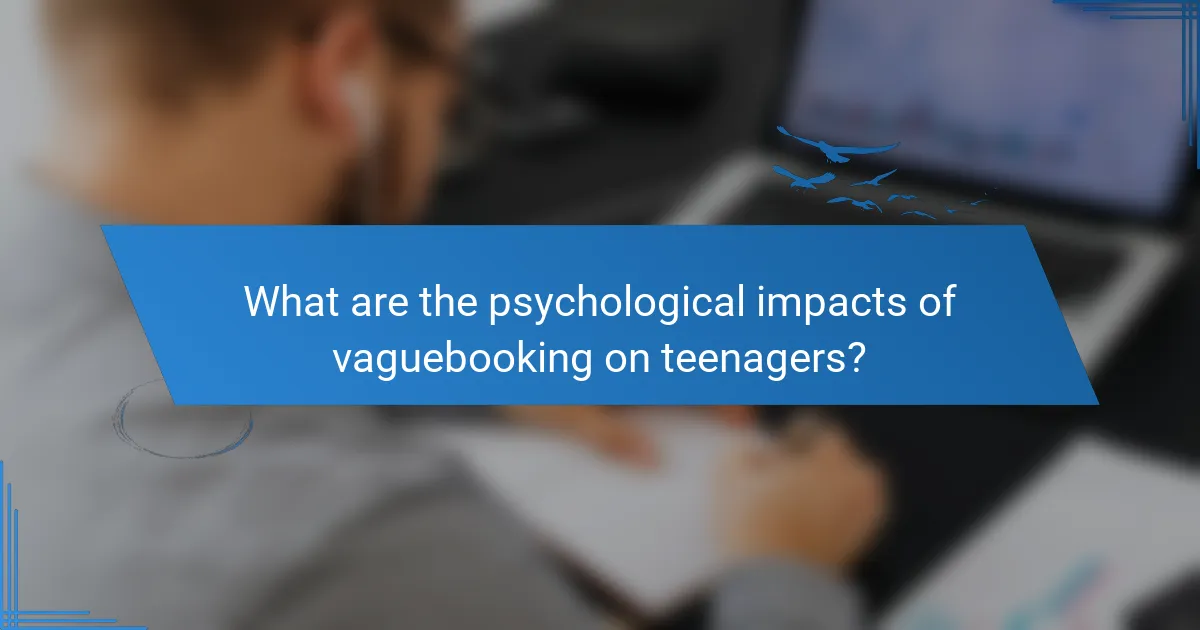
What are the psychological impacts of vaguebooking on teenagers?
Vaguebooking can lead to significant psychological effects on teenagers, primarily by fostering feelings of anxiety and a craving for validation. This behavior often results in uncertainty about social relationships and self-worth, as teens navigate the ambiguous nature of online interactions.
Feelings of anxiety and uncertainty
Vaguebooking often creates a sense of anxiety among teenagers, as they may worry about how their posts will be interpreted by peers. The lack of clarity in these posts can lead to speculation and gossip, further heightening feelings of insecurity.
As teens seek to understand the reactions to their vague posts, they may experience increased stress and uncertainty about their social standing. This can result in a cycle where they feel compelled to post more ambiguously to gauge responses, perpetuating their anxiety.
Desire for validation and attention
Teenagers frequently engage in vaguebooking to elicit responses that provide validation and attention from their peers. The ambiguous nature of these posts can draw in comments and likes, reinforcing the behavior as they seek affirmation.
This desire for validation can lead to a reliance on social media for self-esteem, where the quantity of engagement becomes a measure of worth. It’s crucial for teens to recognize the potential pitfalls of this behavior, such as developing a distorted self-image based on online interactions.
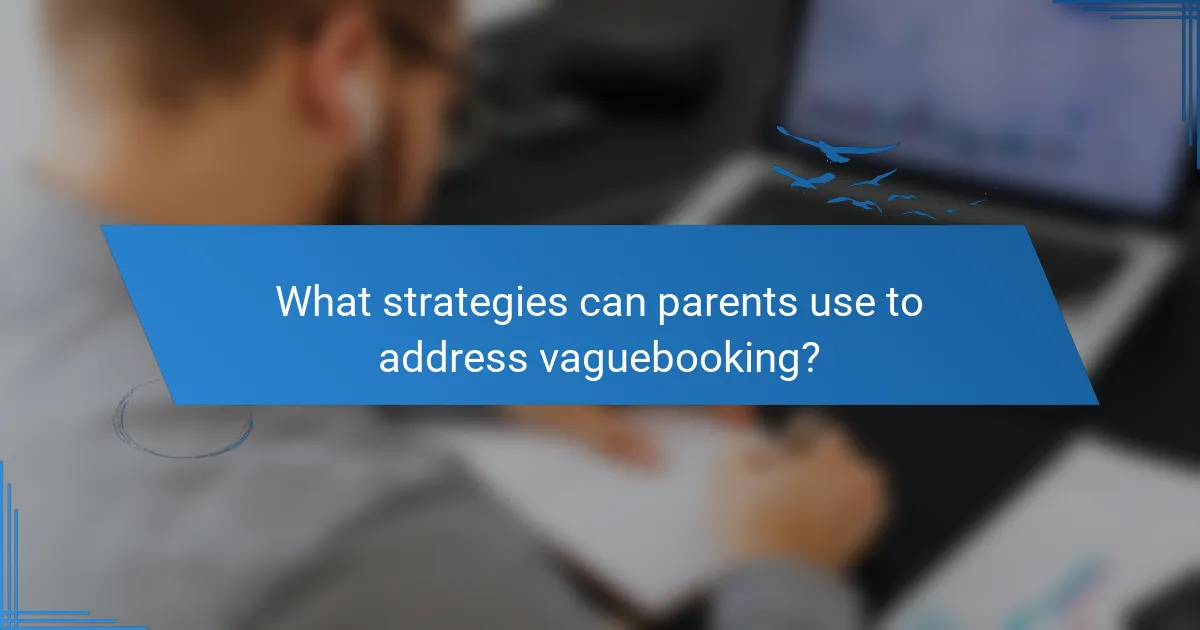
What strategies can parents use to address vaguebooking?
Parents can address vaguebooking by fostering open discussions about social media usage and guiding their teens towards healthier online behaviors. These strategies help create a supportive environment where teens feel comfortable sharing their experiences and understanding the implications of their online actions.
Open communication about social media
Establishing open communication about social media is crucial for addressing vaguebooking. Parents should regularly engage their teens in conversations about their online interactions, encouraging them to share their thoughts and feelings. This dialogue can help parents understand the motivations behind vague posts and offer guidance when needed.
To facilitate these discussions, parents can ask specific questions about what their teens are experiencing online. For example, they might inquire about recent posts their friends made or how certain interactions made them feel. This approach not only builds trust but also helps teens reflect on their own social media behavior.
Encouraging healthy online behavior
Encouraging healthy online behavior is essential in combating vaguebooking. Parents can set clear expectations regarding social media use, such as avoiding ambiguous posts that may lead to misunderstandings or unnecessary drama. Discussing the potential consequences of vaguebooking can help teens recognize the impact of their online presence.
Additionally, parents can promote positive online habits by modeling appropriate social media behavior themselves. They might share examples of constructive posts or engage in discussions about the importance of clarity and honesty in online communication. Providing resources, such as articles or videos on digital citizenship, can further reinforce these lessons.
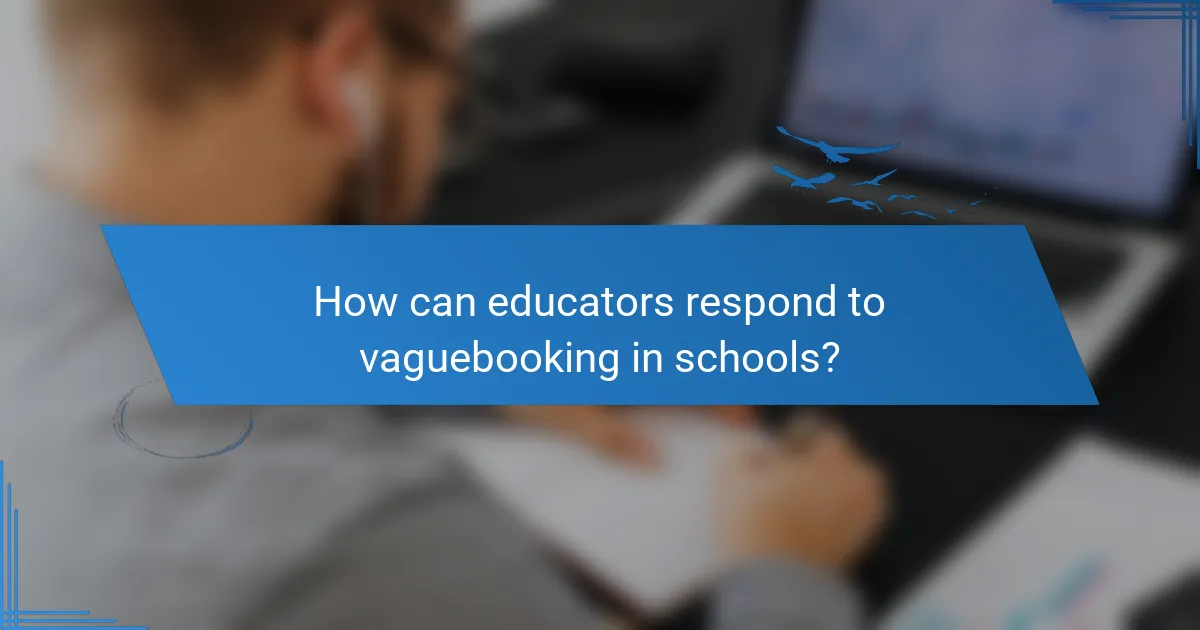
How can educators respond to vaguebooking in schools?
Educators can respond to vaguebooking by fostering open communication and promoting digital literacy among students. Addressing the behavior directly helps students understand the implications of their online actions and encourages healthier interactions on social media platforms.
Implementing digital literacy programs
Digital literacy programs equip students with the skills needed to navigate social media responsibly. These programs should cover topics such as privacy settings, the impact of online behavior, and the importance of clear communication. For instance, workshops could include real-life scenarios where students analyze vague posts and discuss their potential consequences.
Educators can integrate these programs into the curriculum, ensuring that discussions around digital citizenship are ongoing. Utilizing resources from organizations like Common Sense Education can provide structured content and activities that resonate with students.
Creating safe spaces for discussion
Establishing safe spaces for discussion allows students to express their thoughts and feelings about social media use without fear of judgment. Regularly scheduled forums or group discussions can encourage students to share their experiences with vaguebooking and its effects on their peers.
Teachers should facilitate these discussions by setting ground rules that promote respect and confidentiality. This approach not only helps students feel heard but also fosters a supportive community where they can learn from one another’s experiences and develop healthier online habits.

What role does anonymity play in vaguebooking?
Anonymity significantly influences vaguebooking by allowing individuals to share thoughts or feelings without revealing their identities. This can lead to increased engagement among teens, as they feel safer expressing themselves without fear of judgment or repercussions.
Facilitates self-expression
Anonymity in vaguebooking encourages users to share personal experiences and emotions that they might otherwise keep private. For instance, a teen might post a cryptic message about feeling overwhelmed, inviting support without disclosing specific details. This form of self-expression can foster a sense of community among peers who relate to similar feelings.
Moreover, the lack of identifiable information allows users to experiment with their identity and explore different facets of their personality. This can be particularly beneficial for teens navigating complex social dynamics, as it provides a safe space to articulate their thoughts and feelings.
Encourages risky behavior
While anonymity can promote self-expression, it can also lead to risky behavior among teens. The perceived safety of being anonymous may embolden users to post inappropriate or harmful content, such as gossip or negative comments about others. This can escalate conflicts and create a toxic online environment.
Additionally, the lack of accountability may encourage teens to engage in behaviors they would avoid in face-to-face interactions, such as cyberbullying or sharing sensitive information. It’s crucial for parents and guardians to monitor online activity and educate teens about the potential consequences of their actions in anonymous settings.
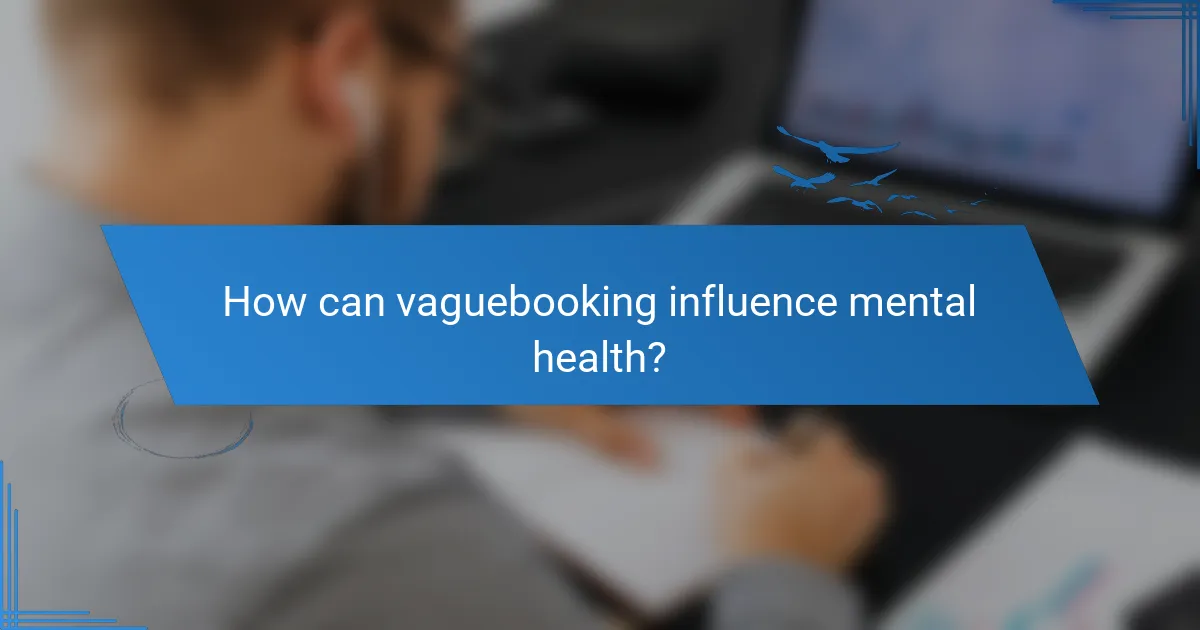
How can vaguebooking influence mental health?
Vaguebooking, the act of posting ambiguous or unclear messages on social media, can significantly impact mental health by fostering feelings of anxiety and uncertainty. This behavior often leads to increased speculation and concern from peers, which can exacerbate emotional distress.
Potential for increased depression
The ambiguity in vaguebooking can create a cycle of negative emotions, potentially leading to increased depression. When individuals post unclear messages, they may be seeking attention or validation but instead receive mixed responses, which can deepen feelings of isolation.
Moreover, the lack of direct communication can prevent meaningful support from friends and family. This isolation can make it harder for individuals to cope with their feelings, leading to a worsening of depressive symptoms over time.
Impact on self-esteem
Vaguebooking can negatively affect self-esteem by inviting judgment and speculation from others. When peers interpret vague posts in various ways, it can lead to misunderstandings and feelings of inadequacy for the poster, especially if the responses are not supportive.
Additionally, the desire for likes or comments on vague posts can create a reliance on external validation. If the engagement is low, it may reinforce feelings of worthlessness, further damaging self-esteem and contributing to a negative self-image.
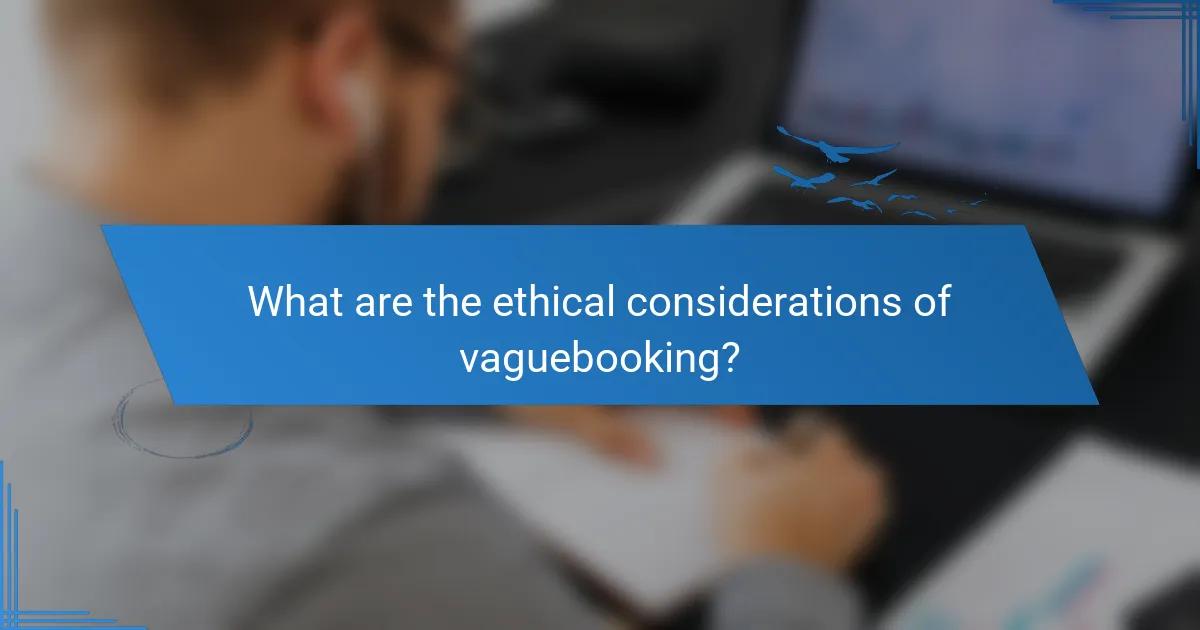
What are the ethical considerations of vaguebooking?
Vaguebooking raises several ethical considerations, primarily revolving around user privacy and the responsibilities of social media platforms. Users often share ambiguous posts that can lead to misunderstandings or emotional distress, while platforms must navigate the fine line between user expression and the potential for harm.
Privacy concerns for users
Vaguebooking can compromise user privacy as ambiguous posts may invite unwanted attention or speculation from friends and followers. This behavior can lead to emotional distress for the poster, especially if their intent is misunderstood or if they feel pressured to clarify their statements.
Moreover, personal information can inadvertently be revealed through vague posts, as users might share details that are identifiable to their social circles. It’s crucial for users to consider the implications of their posts and the potential for misinterpretation.
Implications for social media platforms
Social media platforms face ethical dilemmas regarding vaguebooking, as they must balance user freedom with the need to maintain a safe online environment. Platforms may need to implement guidelines or algorithms to identify and address harmful vague posts that could lead to harassment or emotional harm.
Additionally, vaguebooking can complicate content moderation efforts. Platforms must determine how to handle ambiguous posts without infringing on user expression, which can be a challenging task given the subjective nature of interpretation.
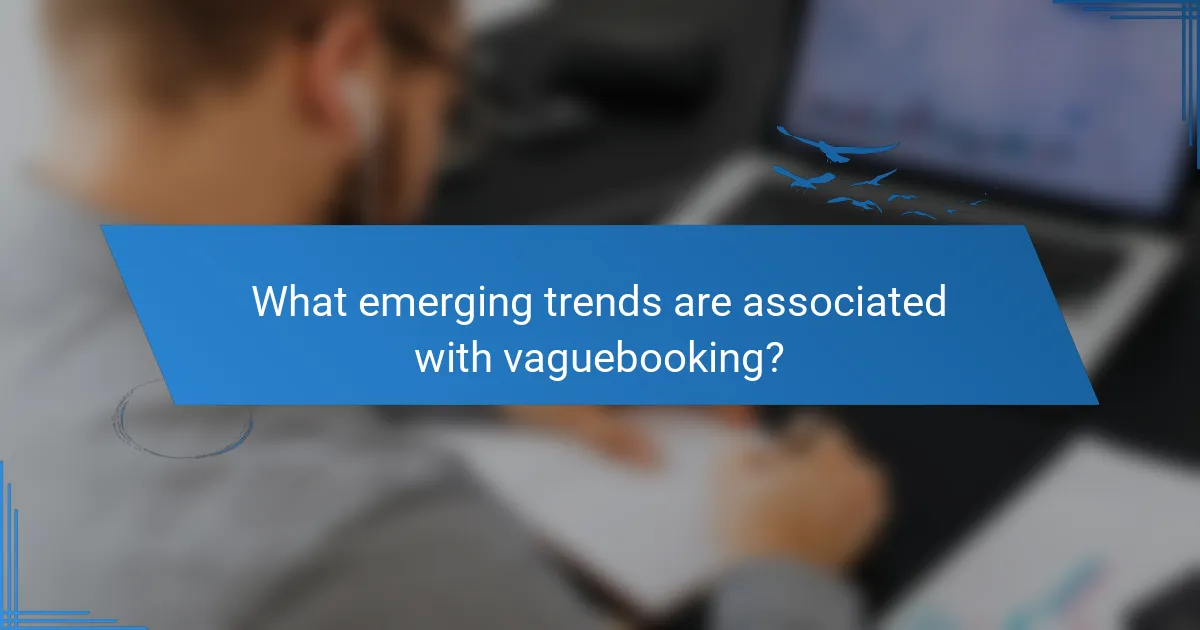
What emerging trends are associated with vaguebooking?
Vaguebooking refers to the practice of posting ambiguous or unclear messages on social media, often to elicit curiosity or engagement. Emerging trends show a shift towards more anonymous platforms and increased emotional expression among teens, impacting how they interact online.
Shift towards more anonymous platforms
The trend towards anonymity in social media is gaining traction, particularly among younger users. Platforms like Yik Yak and Whisper allow users to share thoughts without revealing their identities, fostering a space for vaguebooking without the fear of judgment.
These anonymous platforms can encourage more open emotional expression, as users feel less constrained by their real-life personas. However, this anonymity can lead to negative behaviors, such as cyberbullying or spreading misinformation, which users should be cautious of.
Increased emotional expression
Vaguebooking often serves as a vehicle for emotional expression, allowing users to share feelings without disclosing specific details. This trend is particularly prominent among teens, who may use vague posts to signal distress or seek support without directly asking for help.
While this can create a sense of community, it can also lead to misunderstandings. Friends may misinterpret vague posts, which can result in unnecessary concern or drama. Users should consider being more explicit about their feelings to avoid confusion.
